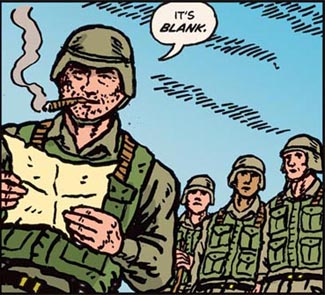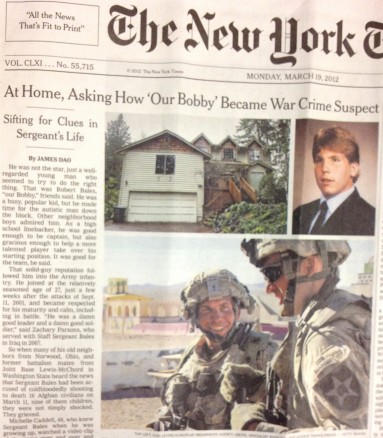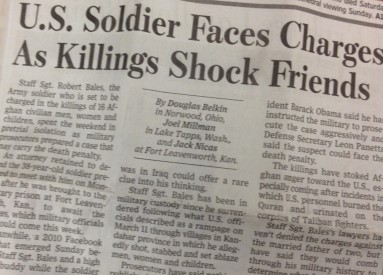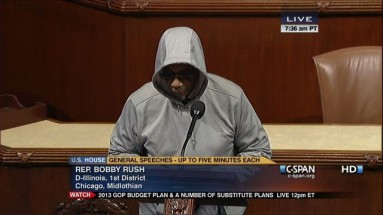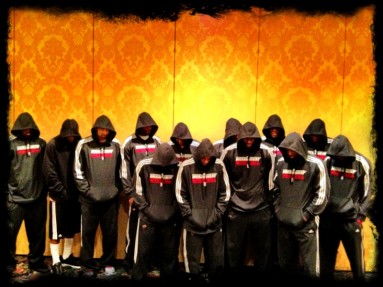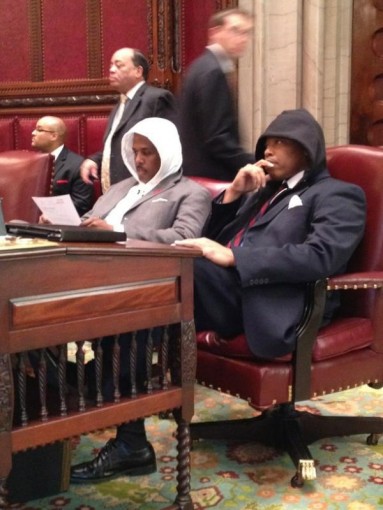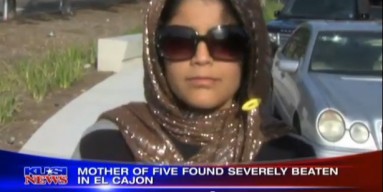People Out of Place is a widely practiced operating principle, though it is seldom spoken about that way. The antithesis to People Out of Place is The Watchmen. People Out of Place and The Watchmen form resolutely opposing social forces, the ultimate dialectical phenomenon in the so-called post-racial, post-empire age.
? ? ?
There are the facts and then there are superimpositions on the facts, and the latter should concern us no less than the former. The facts are the collusion of events in which two men—George Zimmerman in Sanford, Florida and Robert Bales in Kandahar, Afghanistan—are alleged to have hunted down and killed (respectively) Trayvon Martin and Mohamed Dawood, Khudaydad, Nazar Mohamed, Payendo, Robeena, Shatarina, Zahra, Nazia, Masooma, Farida, Palwasha, Nabia, Esmatullah, Faizullah (the last six all the children of Mohamed Wazir), Essa Mohamed, and Akhtar Mohamed. The superimposition on the facts is that Zimmerman and Bales were both called 'mild-mannered' men in biographical sketches that quickly appeared in press accounts. If ever in doubt that a 'killer's psyche' is socially constructed one need not look much further.
What passed as journalistic coverage of these crimes was largely predicated on these biographical markers, a softening of each man's image ('seemed normal,' 'just snapped') that seemed par for the course to anyone observing homegrown and overseas adventures long enough. Bales' 'just snapping'—then reportedly forgetting the event entirely, as the press corps rushed to provide accounts of anti-malarial drugs inducing psychotic episodes—was particularly notable given the fact that he put on night-vision goggles, killed 16 Afghan villagers and wounded six others, and subsequently burned 11 bodies. Bullet points in the children's heads placed their aim at point-blank range, adding a cryptic veneer to this message about drilling into kids' heads.
But the genealogy of Seemed Normal and Just Snapped would eventually wear off. What took their place in the battle for American public opinion were two elements, and I add that both arise out of would-be oral arguments in a court of law: mitigating factors and circumstantial evidence, as opposed to direct factors and evidence. Emotional distress, past financial failings, familial anxiety, and redeployment to the theater of war for Bales; concealed snacks, indexical clothing, and the frayed nerves induced by neighborhood vigilance for Zimmerman. The Watchmen were duly given the benefit of these mitigating and circumstantial defenses because they are first and foremost endowed with the privilege of a normative self. To paraphrase Achebe, Things (Just) Fall Apart.
Things (Just) Fell Apart at precisely the moment when The Watchmen (battling aggravated emotional impairment) and People Out of Place (inescapably encoded with indexes of their difference—melanin, robes, headgear, whatever) encountered each other. Yes, it was a motherfucking dialectical experience. Yet in each case it was The Watchmen that pursued the objects out of place and lived to recount narratives of fear, grief, troubled minds, amnesia, even moral failings. The crucial elements of these encounters is that The Watchmen survived with their interiority (and by extension, humanity) intact, to say nothing of the reverberation of their precious selfhood on family, friends, and loved ones (I kept clips of each one, which was easy to do since they always appeared on the front pages of major newspapers). Meanwhile a hush fell over the demise of the People Out of Place. At least their will to violence was extinguished, the apologia read.
Even at the most critical frontiers of public debate—and if there's an ongoing one it feels like stepping on shards of glass which you can later pick out of your feet, but not without some tissue scarring—I can't help but intuit Bales/the 'war on terror' and Zimmerman/the race wars as hollow shells of each other, distortions of lone, 'singular' violent men trapped in their own mental ghettoes, scoping the thorny terrain of their backyards fully armed, even as the People Out of Place are very much in place, native, autochthonous.
? ? ?
Terror | all-purpose political category for a certain phenotype who murders civilians. Trauma | all-purpose non-political category for the rest.
The material effects of violence may very well be terrorizing and traumatic, but invocations of terror and trauma have served mainly to empty violence of its political significance.
Nonpolitical terror is an empty or neutral signifier. A denotation cast without connotations.
Race, foreignness, and the allochthonous (it is imperative that these be deduced as anything other than white or stand-ins for whiteness) are markers of signification. Denotations fully equipped with connotations.
? ? ?
'When I walk in a room I don't have to speak about race. It's already there.' —Yusef Komunyakaa
? ? ?
Below the fold there were other stories, like Watchmen who deliberately clothed themselves as the People Out of Place, like Agent Monteilh, who at the peak of the FBI infiltration plot Operation Flex earned $11,000 a month for his efforts.
Slowly I began to wear the robes, the hat, the scarf and they saw me slowly transform and growing a beard. At that point, about three or four months later, [my supervisors] said: 'OK, now start to ask questions.'
Monteilh's salary produced diminishing returns: rather than uncovering radical terror networks he ended up traumatising the community he was sent in to snoop. Instead of embracing calls for political jihad or his questions about suicide bombers or his claims to have access to weapons, Monteilh was instead reported to the FBI as a potentially dangerous extremist. This episode is reminiscent of the 'trauma' reported by Zimmerman's neighbors who were afraid of him.
This track of 'reverse' terror and trauma isn't likely to catch on. In the national mythos of 'vigilante' justice I call it the Dwight Schrutification of America. The most iconic figure of a watchman in the first decade of twenty-first century American popular culture (with the possible exception of Jack Bauer) supersedes both the initial 'mild-mannered and subdued' explanatory for racial violence and the secondary stage of psychotic distress.
Everything fades into jolts and jabs of ironic laughter.
And everything out of place continues to present a potential for danger, from a skinny black kid in a gated suburban community who pops up his hoodie when he realizes he is being followed, to others who dot this fragile warscape.
